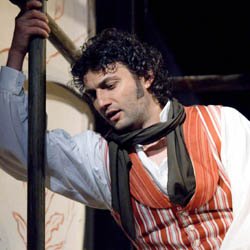|
|
|
|
|
|
|
|
| The Observer, May 18, 2008 |
| by Anthony Holden |
Puccini: Tosca, London, ROH, 12 May 2008
|
He came, he sang, he conquered
|
| A stellar cast was put in the shade by a
simply unforgettable performance from Jonas Kaufmann |
|
 Once in a while, but as rarely as the sun
shines on a first day at Lord's, one singer can singlehandedly lift an opera
from the level of mere excellence into the realms of the unforgettable. Such
is the contribution made by German tenor Jonas Kaufmann to the Royal Opera's
revival of Tosca, in which his exquisitely sung and affectingly acted
Cavaradossi makes the rest of an impressive cast look and sound rather
ordinary. Once in a while, but as rarely as the sun
shines on a first day at Lord's, one singer can singlehandedly lift an opera
from the level of mere excellence into the realms of the unforgettable. Such
is the contribution made by German tenor Jonas Kaufmann to the Royal Opera's
revival of Tosca, in which his exquisitely sung and affectingly acted
Cavaradossi makes the rest of an impressive cast look and sound rather
ordinary.
In her Covent Garden debut, the full-throated Italian soprano Micaela Carosi
would otherwise have raised the roof in a title role originally staged for
Angela Gheorghiu. As the lecherous police chief Scarpia, rotund Italian
baritone Paolo Gavanelli borders on the definitive, were it not for memories
of Bryn Terfel's chilling performance in the 2006 premiere of Jonathan
Kent's stately staging. But Kaufmann's thrilling combination of
stagecraft and musicianship relegates both to the second rank.
His first big aria, 'Recondita armonia', is delivered with such luminous
power and beauty that the audience catches its breath, suddenly aware it is
in the presence of something very special. His cries of 'Vittoria,
vittoria!' in the second act leave the eardrum athrob. In the third, his 'E
lucevan le stelle' is acted as touchingly as it is sung, delivered with such
delicate virtuosity as to put countless hammier, sob-in-voice tenors to
shame.
Stephen Barlow's revival of Kent's production is full of fine detail, such
as Scarpia peeling his apple on to an unwelcome messenger, and the devout
Tosca gently placing a candle on each side of his corpse, in time to the
music, after ferociously stabbing him to death. But the significance of the
giant wing hovering over the Castel Sant'Angelo in the last act still eludes
me; the best explanation I have heard was my companion's - that it
symbolises an angelic ascent to Heaven for the two principals left dead at
the end. In which case, Cavaradossi's is richly deserved.
The evening's other star is Antonio Pappano, who wrings from his fine house
orchestra the deeper darkness - at times shockingly malevolent - that lurks
beneath the sheen of Puccini's wondrous score. Paul Brown's monumental sets
require two half-hour intervals to change, turning what should be a taut,
intensely dramatic evening into a long, lingering one - but on this
occasion it is worth it, to savour the Kaufmann phenomenon. |
|
|
|
|
|
|
|
|
|
|
|
|
|
|
|
|
|
|